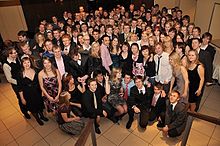- AIESEC
-
AIESEC 
Logo of AIESECFormation 1948 Type non-profit organization run by students Purpose/focus Empowering young people for Peace and the Fulfilment of Humankind's Potential Headquarters Rotterdam, Netherlands Region served Worldwide Membership 64,000 Official languages English (as per internal communication) AIESEC International President (PAI) Tetiana Mykhailiuk Main organ Global Plenary Website www.aiesec.org, www.myAIESEC.net Remarks AIESEC is the world's largest student-run organization AIESEC (pronounced "aie-sek", originally an acronym for Association Internationale des Étudiants en Sciences Économiques et Commerciales) is a global youth organisation that develops leadership capabilities through their internal leadership programmes and engaging students and graduates in international student exchange and internship programmes for profit and non-profit organisations. Its international office is in Rotterdam, Netherlands. As of November 2010[update], the AIESEC network includes over 64,000 members in 110 countries and territories, making it the largest youth-run organisation in the world.[citation needed] It is present in over 2,100 universities across the globe, provides more than 10,000 leadership experiences to its members and sends students and graduates on 16,000 international exchanges yearly.[1]
Contents
History
The idea behind AIESEC started in the 1930s, when representatives from schools across Europe exchanged information about various programs and schools that specialized in business and economics. Students were carrying out internships in other countries, but mostly on their own initiative, and it all came to a standstill with the onslaught of World War II.[2] In 1944, though, the neutral Scandinavian countries were still exchanging: in Stockholm, Bertil Hedberg (official at the Stockholm School of Economics) and the two students Jaroslav Zich of Czechoslovakia and Stanislas Callens of Belgium founded AIESE, the predecessor of AIESEC.[2] Richa Sharma is the OCP Informal activity "to help develop friendly relations between member countries" began in 1946, and AIESEC was officially founded in 1948. At the time, the mission was “to expand the understanding of a nation by expanding the understanding of the individuals, changing the world one person at a time.”[2] In 1949, 89 students participated in the so-called "Stockholm Congress", the first of many exchange programs.[3]
In the late 1950s, AIESEC/Europe reached out to the United States and established contact with Yale University and Columbia Business School to see if either or both would help establish AIESEC in the United States. The result was that they sent three students (Perry Wurst, Norm Barnett and Stephen Keiley) on an exploratory mission to the annual International Conference in Cologne, Germany, in February 1959. Upon their return home, these three students set up AIESEC chapters at both Yale and Columbia. In the summer of 1959, AIESEC/US exchanged twelve traineeships. The following year, AIESEC/US was expanded to six more colleges and exchanged more than thirty traineeships. Also AIESEC/US put forward the nomination of Morris Wolf to be the first Secretary General. He was elected and established the first permanent headquarters for AIESEC in Geneva, Switzerland in 1960. He also expanded AIESEC to Ghana and Nigeria , And later Cameroon in 1988 in the city of Yaounde thereby establishing a beachhead for further expansion in Africa and opening the way for expansion to other continents.
Soon, AIESEC became popular: by the end of 1960, 2467 exchanges were reported, and 4232 by the end of 1970. A landmark in AIESEC history was the “International Theme Programme” that officially established all international, regional, and local seminars on specific topics, which in time grew to be a guideline for future AIESEC generations.[3] In the following decades, debated topics were International Trade, Management Education, Sustainable development, Entrepreneurship and Corporate Responsibility.[3] In the 1990s, intranets called Insight were established to facilitate networking.[3]
Today
AIESEC identifies itself as "the international platform for young people to explore and develop their leadership potential."[4] It annually offers “9,000 leadership positions and delivers over 530 conferences to [its] membership of over 64,000 students". AIESEC also runs an international exchange program that enables over 16,000 students and recent graduates the opportunity to live and intern in another country.”[4]
2008 marked the 60th anniversary of AIESEC's founding. Celebrations occurred in London (January 2008), Tokyo (March 2008), Budapest (May 2008), Brussels (June 2008), Brazil (August 2008), Stockholm (October 2008), and the United States (December 2008).
To maintain its relevance in the face of changing international relations, AIESEC expands the organization to new countries periodically, a process which is outlined in the organization's global compendium. Countries listed as "Official Extensions" of AIESEC as of February 2010, include Algeria, Angola, Bahrain, Benin, Botswana, Cambodia, Ethiopia, Gabon, Georgia, Iceland, Ireland[5], Mongolia, Morocco, Mozambique, The Philippines, Qatar, Kingdom of Saudi Arabia, South Africa, Vietnam, Bangladesh and Zimbabwe.
In 2011, the Expansion Initiative for AIESEC Paraguay was approved by the Global Plenary at AIESEC International Conference in Kenya. The initiative will be led by Ronan Diego de Oliveira, current Joinville (Brazil) Local Committee President. This is the beginning of AIESEC history in Paraguay.
References
- ^ "AIESEC". AIESEC web site. 2010-05. http://www.aiesec.org/cms/aiesec/AI/about/index.html. Retrieved 2010-05-05.
- ^ a b c Kern, Beth (2003-10-02). "AIESEC helps interns make adjustments". University Chronicle. http://media.www.universitychronicle.com/media/storage/paper231/news/2003/10/02/Diversions/Aiesec.Helps.Interns.Make.Adjustments-512353.shtml. Retrieved 2008-02-11.
- ^ a b c d "The AIESEC History". AIESEC web site. Archived from the original on 2008-01-15. http://web.archive.org/web/20080115042949/http://www.aiesec.org/cms/aiesec/AI/About/history/index.html. Retrieved 2008-02-11.
- ^ a b "Welcome to AIESEC". AIESEC web site. http://www.aiesec.org/AI. Retrieved 2008-02-11.
- ^ AIESEC Ireland Website
External links
Categories:- Student exchange
- International nongovernmental organizations
- 1946 establishments
- Youth organizations
- Alumni associations
Wikimedia Foundation. 2010.

